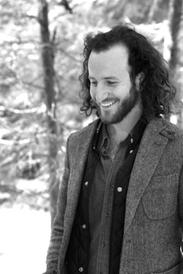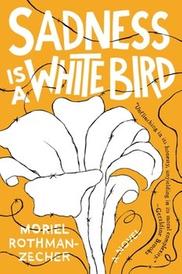
|
|
| photo: Joanna Eldredge Morrissey | |
Moriel Rothman-Zecher is an American Israeli writer, poet and novelist. Born in Jerusalem, he graduated from Middlebury College with a degree in Arabic and political science. He's a recipient of a 2017 MacDowell Colony Fellowship for Literature, and his work has been published in the New York Times, Haaretz, the Paris Review's Daily and elsewhere. He is the author of the novel Sadness Is a White Bird (Atria, February 13, 2018), and he lives in Yellow Springs, Ohio, with his wife, Kayla, and their dog, Silly Department.
On your nightstand now:
On the novel front, I just finished Prodigal Summer by Barbara Kingsolver, and just started Black Deutschland by Darryl Pinckney. The Good Lord Bird by James McBride is up next.
In terms of nonfiction, I am rereading segments of a beautiful, meditative book about running and death called Poverty Creek Journal by Thomas Gardner and the collected writings of Etty Hillesum, An Interrupted Life and Letters from Westerbork.
I'm also reading a lot of poetry these days: American Yiddish Poetry: A Bilingual Anthology, edited by Benjamin and Barbara Harshav; The Selected Poems of Osip Mandelstam, translated by Clarence Brown and W.S. Merwin; Voyage of the Sable Venus and Other Poems by Robin Coste Lewis; A Well of Milk in the Middle of a City (Hebrew: Be'er Halav B'Emtza Ir) by Hezy Leskly.
And I am slowly but surely making my way through Ulysses by James Joyce--I'm a little over halfway through it, and I do intend to persevere.
Favorite book when you were a child:
The Amazing Adventures of Kavalier and Clay by Michael Chabon was one of my favorite books when I first read it at age 12, and remains one of my favorites to this day. I still remember the exquisite mixture of astonishment, relief and joy I felt upon reading Chabon's depictions of Joe Kavalier, who was described as having an "aquiline nose" and as being handsome. The fictional character of Joe Kavalier did a lot for my real-life self-confidence as a big-schnozzed--ahem, aquiline-nosed--preteen.
Your top five authors:
"Top five" feels too daunting--but if I may wordsmith a little and reframe this question as "five of my tops," I'll nominate this quintet:
James Baldwin
Ben Lerner
Eimear McBride
Zadie Smith
David Foster Wallace
Book you've faked reading:
The Catcher in the Rye by J.D. Salinger. For some odd reason, in early high school, I backed myself into something of corner by saying that I'd read The Catcher in the Rye--and hated it. When I was 19 or 20, I finally read it. And liked it just fine.  Book you're an evangelist for:
Book you're an evangelist for:
Infinite Jest by David Foster Wallace. I don't often write in-depth book reviews (although I do have a Google doc that I share with close friends in which I recommend, in three or four lines, my favorite 25 books I read each year), but after reading Infinite Jest six years ago, I wrote this review/rave/recommendation.
Book you've bought for the cover:
They Can't Kill Us Until They Kill Us by Hanif Abdurraqib. I was immediately drawn to the defiant, tautological title, and to the odd, enthralling cover image of a slightly befuddled-looking wolf wearing a thick gold chain and a red tracksuit--at once vulnerable and strange, fierce and earnest. (The essays were excellent--and the author is also from Ohio!)
Book you hid from your parents:
Well, an edition of the Kama Sutra that I somehow got my 12-year-old hands on. Maybe also Youth in Revolt by C.D. Payne.
Book that changed your life:
There are so many, but I think, for this one, I'll go with Born to Run by Chris McDougall. I'd estimate that 17 out of every 20 books I read are novels, but this work of nonfiction was my gateway into the joys and quirks and possibilities of long-distance running. Running, in turn--and in particular trail running, with marathons and ultramarathons thrown in along the way to keep me moving--is how I keep sane, sharp, joyful and well--mentally, physically, spiritually. I do a lot of my writing--revising, plotting, editing, dreaming--while on the trails. And there was a lot of resonance between the experiences of running my first ultramarathon and writing my first novel.
Favorite line from a book:
I adore the following passage from Karen Joy Fowler's We Are All Completely Beside Ourselves. It is, in general, an exquisite, delightful book. I won't go into its plot for fear of ruining the wondrous surprise this book delivers, but I will say that reading it made me a better and wiser and wider person. Anyhow, the passage is from a section in which the narrator Rose's family are discussing the SATs:
" 'I remember Rose's scores.' Peter whistled appreciatively. 'I didn't know how impressed I should have been. That's a hard test, or at least I thought so.' Such a sweetheart. But don't get attached to him; he's not really part of the story."
Five books you'll never part with:
A signed galley of Jacqueline Woodson's novel Another Brooklyn. A highly annotated version of A Land of Two Peoples, which is a collection of Martin Buber's writings and letters edited by Paul Mendes-Flohr. My tattered and scribbled in edition of Infinite Jest by David Foster Wallace. My copy of Khirbet Khizeh by S. Yizhar. An old, gray volume, Short Stories by Leo Tolstoy (I liked the stories well enough, but this particular copy is mostly important because of the fact that I first scribbled Kayla Zecher's phone number on the inside cover, back when I was Moriel Rothman).
Book you most want to read again for the first time:
Lore Segal's Her First American. It is such a marvelously strange, moving, funny and beautiful book, and each page contained new surprises, heartbreaks, insights and idiosyncrasies. The book is packed with understated, brilliant dialogue, and the details of Ilka and Carter's relationship--and of the world bustling and flailing around them--make this one of my favorite novels.

